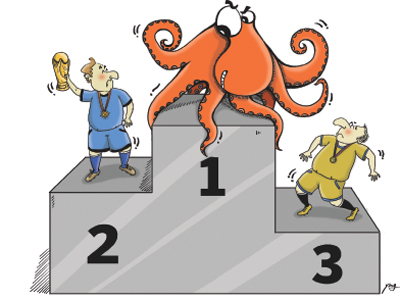 |
Large Medium Small |

A recent survey of 1,251 people by domestic research company Horizon found that 14 percent believed their health had been affected by the 2010 tournament in South Africa, which concluded when Spain defeated Holland 1-0 on Monday.
More than 70 percent of those polled also said they had suffered side effects due to regularly watching the late games, which kicked off at 10 pm and 2:30 am. The number of discussion groups on Sina.com’s microblog service (China’s version of Twitter) on Monday under such titles as “I’m tired” and “I feel sleepy” was roughly 140,000.
China has a larger number of soccer fans than anywhere else in the world — audience figures released by FIFA, the world sport’s governing body, show that a record-breaking 52 million people in China watched Germany take on Argentina in the quarterfinals.
About 25 million Chinese fans on average tuned in for the games that kicked off at 2:30 am each day, double the amount that watched the 2006 World Cup in Germany. In this case, side effects are to be expected, said health experts.
“I felt a sense of loss as soon as the World Cup ended,” said Ling Guangxi, an engineer in Fuzhou, capital of Fujian province, on Monday.
Ling received a warning from his supervisor weeks ago after watching the late games left him exhausted.
“I bought many books online. I hope they will help me survive the first few days without the World Cup,” he said.
However, 24-year-old IT technician Liu Huarui insisted that, although a die-hard Argentina fan, she had escaped any side effects of her month-long soccer addiction.
“I did watch several games in the middle of the night but I quickly made an adjustment the next day,” she said. “Yes, the World Cup is over. Yes, we miss it. But life goes on.”
Tian Chenghua, a professor with the institute for psychiatric research at Peking University’s No 6 Hospital, said it might take at least a week for most soccer fans to shake off their despondent mood.
“They better eat some light food,” he suggested, before explaining that for some fans, soccer is not a sport but a belief.
“Urban residents usually live under huge pressure. The World Cup is a way of (relieving it),” he said.